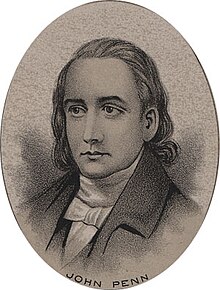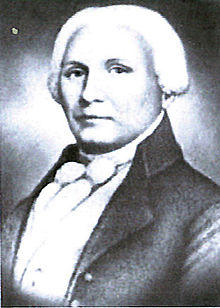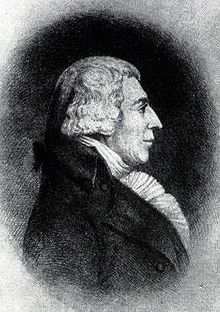
The North Carolina General Assembly is the bicameral legislature of the state government of North Carolina. The legislature consists of two chambers: the Senate and the House of Representatives. The General Assembly meets in the North Carolina State Legislative Building in Raleigh.
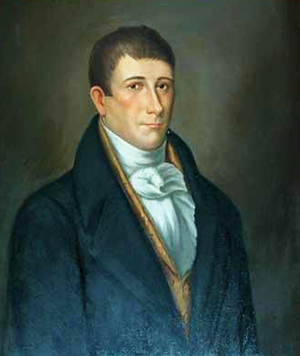
Benjamin Williams was the 11th and 14th Governor of the U.S. state of North Carolina, from 1799 to 1802 and from 1807 to 1808. He was the first of two North Carolina Governors since the American Revolution to serve nonconsecutive terms.

The North Carolina General Assembly of 1777 met in two sessions in New Bern, North Carolina, from April 7 to May 9, 1777, and from November 15 to December 24, 1777. This was the first North Carolina legislature elected after the last provincial congress wrote the first North Carolina Constitution. This assembly elected Richard Caswell as the state's first constitutional governor.
The North Carolina General Assembly of 1778 met in three sessions in three locations in the years 1778 and 1779. The first session was held in New Bern from April 14 to May 2, 1778; the second session in Hillsborough, from August 8 to August 19, 1778; the third and final session in Halifax, from January 19 to February 13, 1779.
The North Carolina General Assembly of 1779 met in three sessions in three locations in the years 1779 and 1780. The first session was held in Smithfield from May 3 to May 15, 1779; the second session in Halifax, from October 18 to November 10, 1779; the third and final session in New Bern, from January to February, 1780.
Joseph Riddick was a North Carolina politician who served as Speaker of the North Carolina Senate for 11 years from 1800 to 1804 and from 1806 to 1811. Only Bartlett Yancey and Marc Basnight have led the state Senate for a longer span of time. Riddick was also a veteran of the American Revolutionary War. He attained the rank of General in the NC Militia.
The North Carolina General Assembly of 1780-1781 was the fourth elected legislative body of the State of North Carolina. The assembly consisted of a Senate and House of Commons that met in three sessions in at least two locations in the years 1780 and 1781. Each of the existing 50 North Carolina counties were authorized to elect one Senator and two members of the House of Commons. In addition, six districts also elected one House member each. The first two sessions were probably held in New Bern, North Carolina in April and September 1780. The third session met in Halifax from January 27, 1781 – February 13, 1781.
The North Carolina General Assembly of 1836–1837 met in the Government House in Raleigh from November 21, 1836 to January 23, 1837. The assembly consisted of the 120 members of the North Carolina House of Commons and 50 senators of North Carolina Senate elected by the voters in August 1836. During the 1836 session, the legislature created Davie County, but it was not until 1842 that Davie County began sending delegates to the General Assembly. William H. Haywood, Jr was elected speaker of the House of Commons and Charles Manley was elected clerk. Hugh Waddell was elected President of the Senate and Thomas G. Stone was elected Clerk. Richard Dobbs Spaight, Jr. was the Governor in 1835 and 1836. He was elected by the previous legislature. In 1837, the Governor of North Carolina, Edward Bishop Dudley from New Hanover County, was elected, for the first time, by the people vice the legislature. The Whigs would control North Carolina politics until 1850. While in power, their notable achievements included funding railroads and roads, public education, and State chartered banks.

The North Carolina General Assembly of 1860–1861 met in Raleigh, North Carolina in regular session from November 19, 1860, to February 25, 1861. They met in extra sessions from May 1, 1861, to May 13, 1861, and from August 15, 1861, to September 23, 1861. This General Assembly decided that each county should vote for special delegates who would decide whether North Carolina should secede from the Union. On May 20, 1861, those special delegates convened in Raleigh and voted unanimously that the state would no longer be a part of the United States of America.
The North Carolina General Assembly of 1782 was the state legislature that first convened in Hillsborough, North Carolina, on April 15, 1782, and concluded on May 18, 1782. Members of the North Carolina Senate and the North Carolina House of Commons were elected by eligible North Carolina voters.
The North Carolina General Assembly of 1783 was the state legislature that convened in Hillsboro, North Carolina from April 18, 1783, to May 17, 1783. Members of the North Carolina Senate and the North Carolina House of Commons were elected by eligible North Carolina voters. This was the last assembly to meet during the American Revolution. Much of their time was devoted to taking care of the North Carolina soldiers that fought in the war.
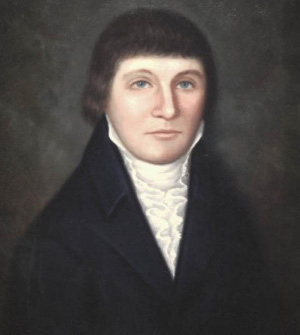
The Fifth North Carolina Provincial Congress was the last of five extra-legal unicameral bodies that met beginning in the summer of 1774. They were modeled after the colonial lower house. These congresses created a government structure, issued bills of credit to pay for the movement, organized an army for defense, wrote a constitution and bill of rights that established the state of North Carolina, and elected their first acting governor in the fifth congress that met in 1776. These congresses paved the way for the first meeting of the North Carolina General Assembly on April 7, 1777 in New Bern, North Carolina. The Fifth Congress met in Halifax from November 12 to December 23, 1776. Richard Caswell served as president, with Cornelius Harnett as vice-president.

The North Carolina Constitutional Convention of 1835 was a meeting of delegates elected by eligible voters in counties in the United States state of North Carolina to amend the Constitution of North Carolina written in 1776 by the Fifth North Carolina Provincial Congress. They met in Raleigh, North Carolina from June 4, 1835, to July 11, 1835, and approved several amendments to the constitution that were voted on and approved by the voters of North Carolina on November 9, 1835. These amendments improved the representation of the more populous counties in the Piedmont and western regions of the state and, for the first time, provided for the election of the governor by popular vote rather than election by the members of the General Assembly.
The North Carolina General Assembly of 1835 met in Raleigh from November 16, 1835 to December 22, 1835. The assembly consisted of the 137 members of the North Carolina House of Commons and 65 senators of North Carolina Senate elected by the voters in August 1835. This was the last assembly elected before the amendments to the Constitution of North Carolina from the North Carolina Constitutional Convention of 1835 took effect. Thus, the House of Commons included representatives from towns and the number of members of the house was greater than 120. William H. Haywood, Jr was elected speaker of the House of Commons and Charles Manley was elected clerk. William D. Mosely was elected President of the Senate and William J. Cowan was elected Clerk. Richard Dobbs Spaight, Jr. was elected the Governor by the assembly and served from December 10, 1835 to December 31, 1836. He was the last governor of North Carolina to be elected by the General Assembly.
The North Carolina General Assembly of April to June 1784 met in New Bern from April 19 to June 3, 1784. The assembly consisted of the 120 members of the North Carolina House of Commons and 50 senators of North Carolina Senate elected by the voters in April 1784. As prescribed by the 1776 Constitution of North Carolina, the General Assembly elected Alexander Martin to continue as Governor of North Carolina. In addition, the assembly elected members of the Council of State.
The North Carolina General Assembly of October 1784 met in New Bern from October 25, 1784 to November 26, 1784. The assembly consisted of the 116 members of the North Carolina House of Commons and 55 senators of North Carolina Senate elected by the voters on August 20, 1784. As prescribed by the 1776 Constitution of North Carolina the General Assembly elected Richard Caswell as Governor of North Carolina and members of the Council of State.
The North Carolina General Assembly of 1785 met in New Bern from November 18, 1785, to December 29, 1785. The assembly consisted of the 114 members of the North Carolina House of Commons and 54 senators of North Carolina Senate elected by the voters on August 19, 1785. During the 1785 session, the legislature created Rockingham County. As prescribed by the 1776 Constitution of North Carolina the General Assembly elected Richard Caswell to continue as Governor of North Carolina and members of the Council of State.

The North Carolina General Assembly of 1868–1869 met in Raleigh from November 16, 1868, to April 12, 1869, with a special session from July 1, 1868, to August 24, 1868. This was the first assembly to meet after the approval of the new Constitution of North Carolina in 1868. As prescribed in this constitution, the assembly consisted of the 120 members in the North Carolina House of Representatives and 43 senators in the North Carolina Senate elected by the voters on August 6, 1868. This assembly was in control of the Republican Party and was dominated by reconstruction era politics.
The North Carolina General Assembly of 1862–1864 met in Raleigh from November 17, 1862, to December 22, 1862. Extra sessions were held on January 19, 1863 – February 12, 1863; June 30, 1863 – July 7, 1863; November 23, 1863 – December 14, 1863; and May 17–30, 1864. The assembly consisted of the 120 members of the North Carolina House of Commons from 82 counties and 50 senators representing one or more counties in North Carolina Senate elected by the voters in October 1862. Zebulon Baird Vance was Governor of North Carolina during this assembly. This assembly met during the American Civil War as part of the Confederate States of America. Much of the legislation passed by this assembly dealt with the managing the state and its population during wartime.
